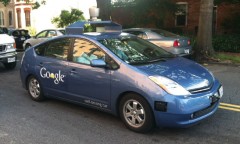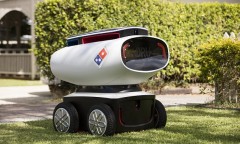By Steve Pak, | April 12, 2016

Ford Self-Driving Car
Ford has been testing its autonomous vehicles (AVs) in complete darkness, which in the future could make life easier for people who do not like driving in the dark. The self-driving cars' sensors and cameras are not very helpful at nighttime, but lidar sensors work better in the dark than in rain and snow. In a video the American automaker shows how the robot car's lidar sensors help it to find its way on the test track without its headlights switched on.
Like Us on Facebook
AV sensors usually rely on sunshine or street lights to navigate on roads. However, the video shows that the Ford self-driving car can stay on a winding road at night, and without its headlines turned on, according to Fortune.
The company's driverless cars usually use various tools to pick up and avoid various objects around the car. They include a combination of sensors, radar, and light-sensitive radar known as lidar. Ford reported that the video captured at its Arizona testing grounds shows that the futuristic car can work autonomously on roads without any stoplights.
Jim McBride is Ford's technical leader for autonomous vehicles. He explains LiDAR allows the vehicle to work without the sun shining or cameras picking up white lines on the road.
Lidar functions by sending out short beams of laser light. That allows the car's software to build a detailed 3D map of the objects surrounding the vehicle. Ford's lidar tech emits 2.8 million laser pulses each second.
Driverless cars' lidar should be good at night driving, yet the video still focuses on how AVs could make driving safer in the future by seeing obstacles in the dark, according to Gizmodo. More difficult tasks are avoiding random situations such as people running across the street.
In related news a United States car industry group has asked US regulators to slow down the introduction of self-driving cars to the retail market. The National Highway Traffic Safety Administration (NHTSA) has announced its plans to develop guidance for the safe operation of AVs during the next half year.
However, at a hearing on April 8, Friday the Association of Global Automakers warned that the NHTSA should write rules and not just provide advice.
This video explains lidar tech:
-
Use of Coronavirus Pandemic Drones Raises Privacy Concerns: Drones Spread Fear, Local Officials Say

-
Coronavirus Hampers The Delivery Of Lockheed Martin F-35 Stealth Fighters For 2020

-
Instagram Speeds Up Plans to Add Account Memorialization Feature Due to COVID-19 Deaths

-
NASA: Perseverance Plans to Bring 'Mars Rock' to Earth in 2031

-
600 Dead And 3,000 In The Hospital as Iranians Believed Drinking High-Concentrations of Alcohol Can Cure The Coronavirus

-
600 Dead And 3,000 In The Hospital as Iranians Believed Drinking High-Concentrations of Alcohol Can Cure The Coronavirus

-
COVID-19: Doctors, Nurses Use Virtual Reality to Learn New Skills in Treating Coronavirus Patients











